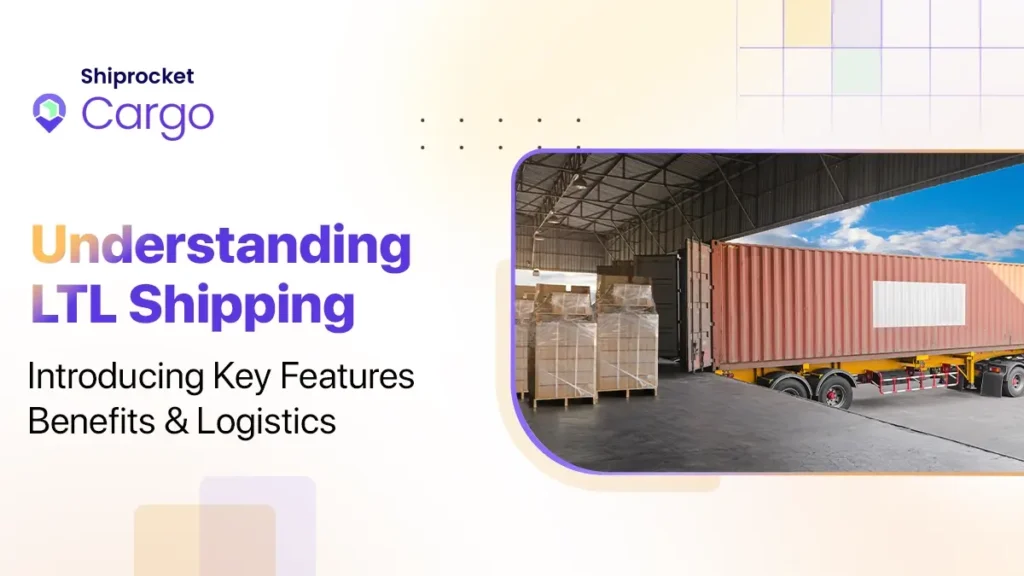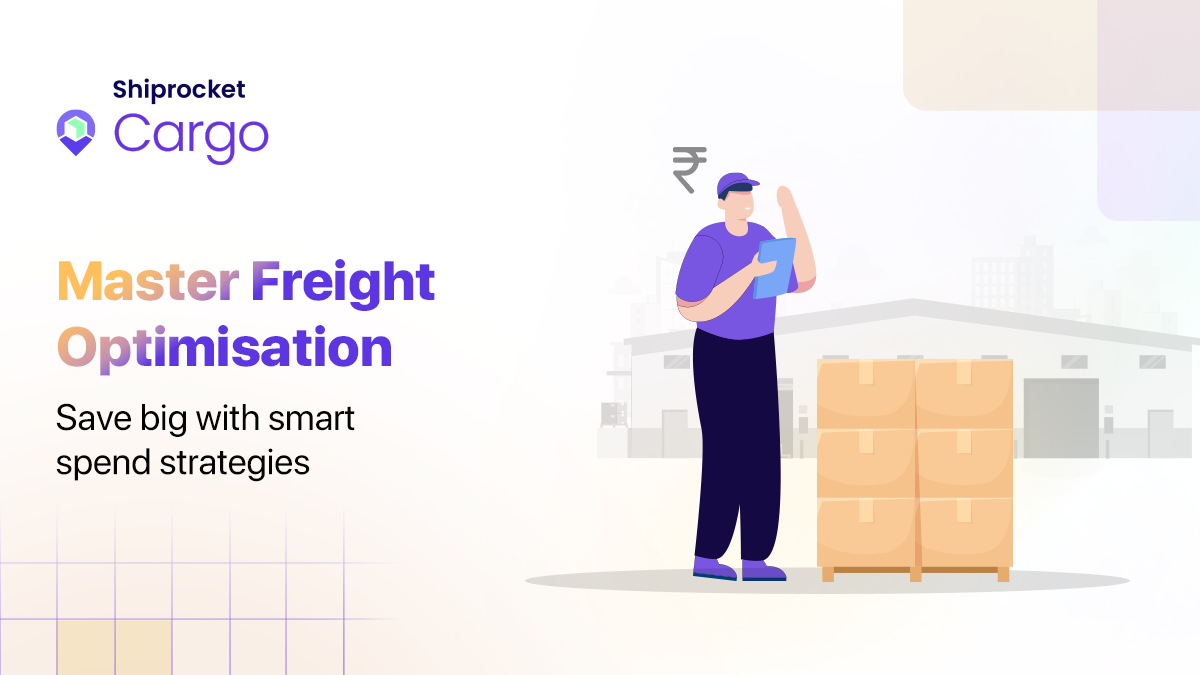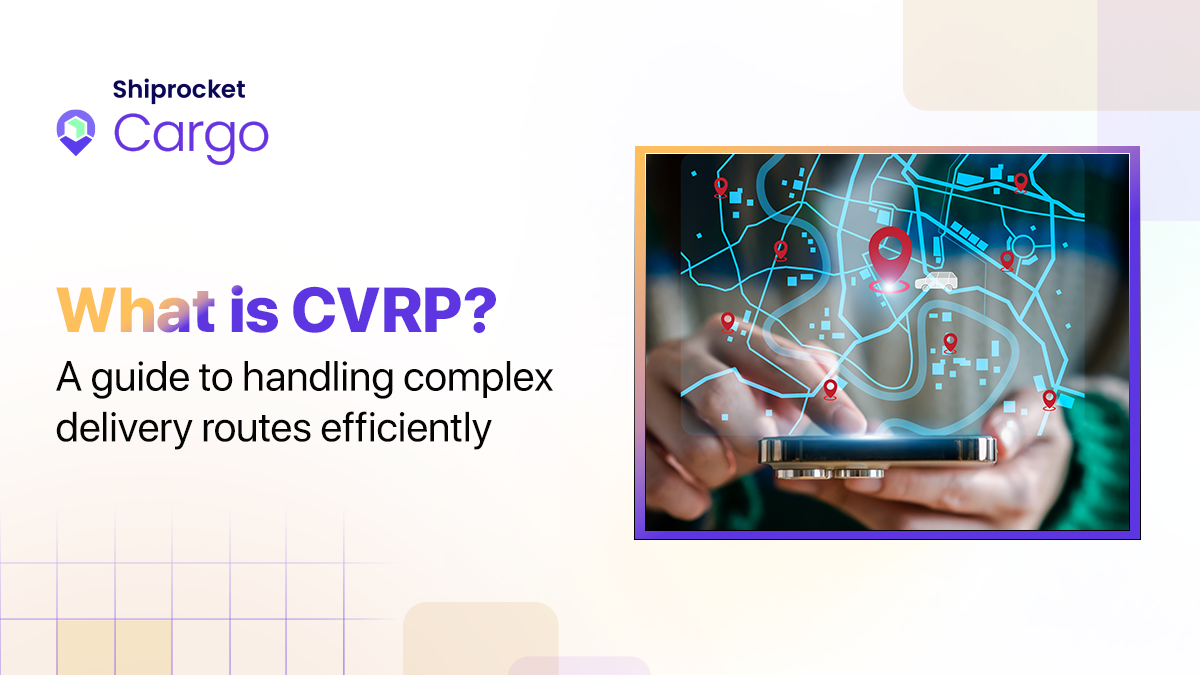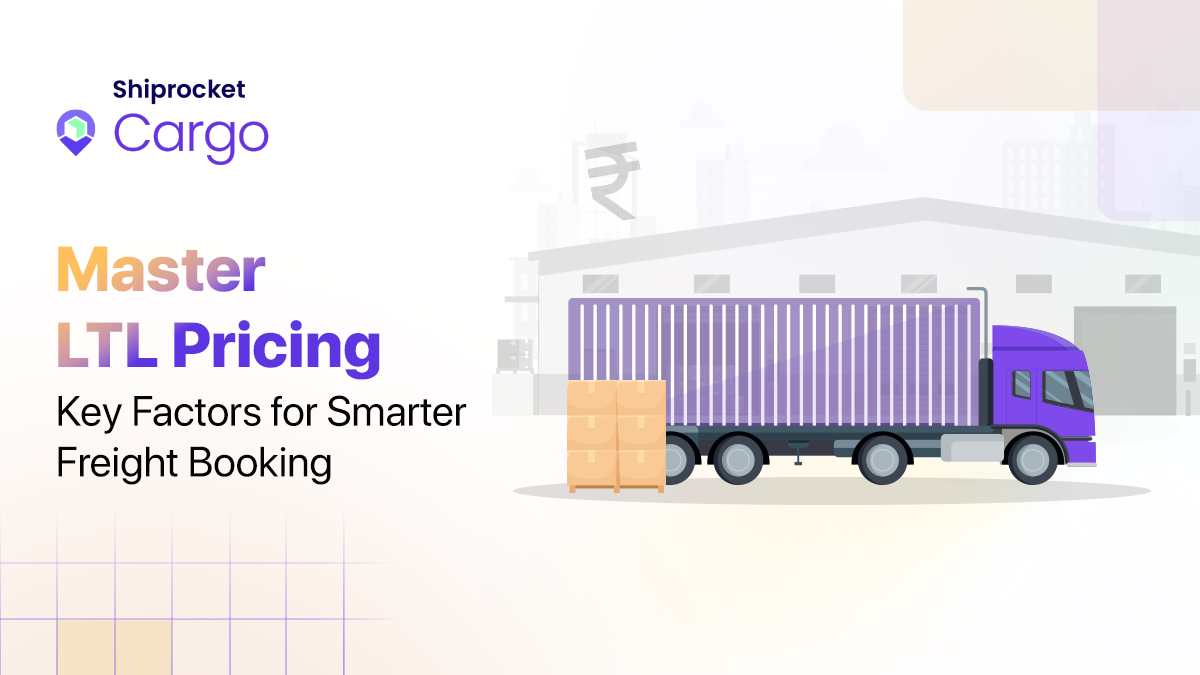LTL Shipping and its Benefits to Ensure Customer Satisfaction
- How Does LTL Shipping Work?
- Basic step-by-step breakdown:
- How LTL Logistics Work
- LTL Carriers and Their Role
- Key Features of LTL Shipping
- Advantages and Disadvantages of LTL Freight
- Disadvantages of LTL Shipping
- Comparing LTL, FTL, and Parcel Shipping
- Modernise your Large Shipping Requirements With Shiprocket Cargo
- Conclusion
As eCommerce continues its exponential growth, businesses want to streamline their shipping and logistics. Effective delivery solutions significantly impact customer satisfaction. LTL (Less than Truckload) shipping has slowly carved out its niche for small to medium-sized businesses. This service allows companies to ship commodities that do not require a full truck. It is a more economical and efficient means of sending cargo from one location to another.

Understanding LTL Freight Shipping
LTL shipping is a logistics service used to move goods that don’t take up the space of a full truck. An LTL arrangement consolidates several shipments belonging to different businesses into one truckload. Thus, it allows multiple sellers to share space and transportation costs, where each seller pays for the space their shipment occupies.
LTL Freight is ideal for businesses with shipments too large for parcel services but too small to justify renting an entire truck. Typical LTL shipments range from 150 pounds to 15,000 pounds and occupy less than 12 feet of trailer space.
How Does LTL Shipping Work?
LTL Shipping normally involves palletising the freight and loading it onto a truck along with other shipments of various businesses. Once the freight is set and ready, it will be picked up from the sender’s location and shipped to the local terminal. From there, it would be combined with other LTL shipments that move in the same general direction.
Basic step-by-step breakdown:
Order Pickup: The LTL carrier picks up the shipment from the shipper’s location.
Transportation to Terminal: The shipment is taken to the local terminal, sorted, and combined with other freight.
Hub and Spoke Model: LTL carriers move shipments using a hub-and-spoke system. This means that freight will be sorted and passed through several terminals before reaching a distribution hub near the delivery destination.
The cargo is then taken out of the truck at one final terminal for delivery to the recipient’s location.
How LTL Logistics Work
LTL shipping is a complex logistic operation that utilises available space effectively by ensuring timely delivery. The operation follows a hub-and-spoke model where freight is moved through a network of terminals before reaching their destination. This system allows LTL carriers to minimise their empty miles, therefore economising shipping costs for all parties concerned.
LTL Carriers and Their Role
LTL carriers play a crucial role in the shipment process. The carrier will organise the pickup, consolidation, and delivery of several shipments. These carriers generally maintain a multifaceted terminal system and distribution center that will enable them to efficiently handle large volumes of small shipments.
LTL carriers also offer various value-added services:
- Liftgate service for customers without loading docks
- Inside delivery for residential or specific drop-off sites
- White glove services for fragile or valuable items
These additional options make LTL shipping flexible for varied business types.
Tracking and Monitoring of LTL
Real-time tracking is an important aspect of LTL logistics. Carriers use advanced software to provide information regarding the location and status of business shipments. For instance, Shiprocket Cargo uses a seamless tracking mechanism that lets the sellers track their LTL freight in real-time, thereby helping them improve customer service.
Key Features of LTL Shipping
Some important features of LTL shipping make it ideal for businesses that intend to balance cost, speed, and efficiency. These characteristics include:
1. Cost-Effectiveness
You can share the cost of a truckload with other sellers in LTL shipping. Since you pay only for the truck space used by your goods, it is considerably more economical for small or medium-sized shipments.
2. Flexibility
Shipment size is flexible with LTL shipping. Whether you ship a few pallets or several thousand pounds of freight, you can find an option that will work without paying for unutilised space.
3. Wide Network
The LTL carriers operate on an expansive network of terminals, hubs, and routes that allow businesses to reach various destinations across the country efficiently.
These carriers provide wide coverage, such as Shiprocket Cargo, so your shipment can reach multiple locations in a minimum time.
4. Freight Consolidation
One of the most impressive aspects of LTL shipping is freight consolidation. Several shipments are taken together and built into one truckload, effectively using the space and reducing the overall environmental impact since there will be fewer trucks on the road.
5. Accessorial Services
LTL carriers offer major additional services, like liftgate services, residential deliveries, and special handling requirements for fragile or high-value items. These may be tailored to the shipper’s specific requirements.
6. Tracking and Safety
Advanced LTL shipping solutions, such as Shiprocket Cargo, provide detailed tracking capabilities, thus allowing the seller to stay updated in real-time about their shipment. This improves visibility into the supply chain and reduces delays or misplacements.
Advantages and Disadvantages of LTL Freight
Understanding these advantages and disadvantages will be crucial for businesses to make informed shipping decisions.
Advantages of LTL Shipping
Cost Savings: LTL shipment is more economical for small shipments because you only pay for the truck space your goods occupy.
Environmentally Friendly: By consolidating shipments, LTL shipping lessens the number of trucks on the highway, leading to lesser emissions and a lesser carbon footprint.
Security Enhanced: As goods are palletised, it reduces handling and limits the possibility of damage or loss in transit.
Versatility: Since there are a lot of shipment sizes in LTL shipping, its field of application covers a wide range of industries and products.
Access to Services: LTL shipping provides services, like liftgates, inside deliveries, and notifications, to meet your business’s specific requirements.
Disadvantages of LTL Shipping
Longer Transit Times: Because LTL freight is consolidated and will stop at different terminals and distribution hubs, the time to complete delivery will be extended compared to FTL or direct shipping methods.
Complexity: LTL shipments usually involve more stops and more cargo transfers, creating a heightened level of complexity and increasing delays or the possibility of damage to the goods.
Inconsistent Pricing: Prices for LTL may vary depending on weight, size, and density apart from shipping zones, which may cause inconsistency in pricing for the seller.
Comparing LTL, FTL, and Parcel Shipping
Sellers often compare LTL, Full Truckload (FTL), and even parcel shipping to choose the best methods for their business. Depending on the size of your shipment and what you are shipping, each has different favourable attributes.
LTL vs. FTL Shipping
LTL Shipping: This applies to relatively smaller shipments that do not require or use up an entire truckload capacity. You share the truck space with other shippers, so it’s more affordable; however, it takes longer to ship via this method since it has various stops.
FTL Shipping: This applies to larger shipment sizes that require a full truck. FTL means the whole truck will be used by one shipment alone. This makes it faster but more expensive.
LTL vs. Parcel Shipping
LTL Shipping: More economical for shipments that are too large for parcel services but too small for a full truck. It is ideal to ship by pallet and for bulkier items.
Parcel Shipping: Good for little, individual packages under 150 pounds. It is faster but more expensive when sending larger shipments in bulk.
Modernise your Large Shipping Requirements With Shiprocket Cargo
Shiprocket Cargo covers all your needs for less-than-truckload shipments. Here’s how Shiprocket Cargo can help sellers modernise their large shipping requirements:
Economical Solution
LTL shipping services through Shiprocket Cargo allow a seller to save on shipping costs by consolidating their shipment with others. It is not only economical but it also enables you to get value out of every shipment.
Advanced Freight Technology
Shiprocket Cargo uses advanced logistics technology for route optimisation, real-time tracking, and freight quotes to determine the exact amount a seller has to pay. It works as a step in enabling businesses to maintain their shipment processes much more effectively and transparently.
Flexible and Scalable Services
Shiprocket Cargo offers flexible solutions, whether you are shipping just a few pallets or much larger loads. They have an extended nationwide network that ensures your freight can reach out to every destination in India and beyond.
Customised Shipping Options
Shiprocket Cargo provides you with tailor-made shipping options as per your business requirements. From specialised handling to express shipping services, their solutions cover all sorts of logistic services.
Seamless Integration with eCommerce
If you’re an e-retailer, then integrating your shipment with Shiprocket Cargo is smooth. With APIs connected right to your online store, management of LTL shipments becomes easy like parcel shipment.
Conclusion
LTL shipping is cost-effective and can be utilised by those businesses whose shipment sizes are small and cannot fill a whole truck. Your decision-making will be truly informed by understanding how LTL logistics works, the key characteristics of LTL shipping, and the pros and cons of using less than a truckload freight transportation service. When upgrading your large shipment needs, Shiprocket Cargo becomes a trusted partner in providing innovative solutions that fully optimise the benefits of LTL shipping and further streamline your overall logistics operation.




